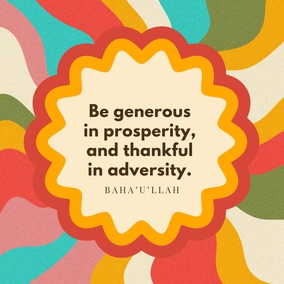The views expressed in our content reflect individual perspectives and do not represent the authoritative views of the Baha'i Faith.
As a graduate student a professor challenged me to present my own definition of communication and I came up with “mutual meaning-making.”
This way of looking at communication highlights the relationship give-and-take inherent in true consultation with another person, and disregards the primacy of power, although power may be one of the meanings being shared. When you’re mutually making meaning with someone else, your communication doesn’t focus just on an exchange of words, but includes every nonverbal aspect. It also fits well with the elegant Baha’i teachings about the art of consultation, like this one from the writings of Abdu’l-Baha:
The first condition is absolute love and harmony …. They must be wholly free from estrangement and must manifest in themselves the Unity of God, for they are the waves of one sea, the drops of one river, the stars of one heaven, the rays of one sun, the trees of one orchard, the flowers of one garden.
Think of the groups you belong to – would they be able and willing to fulfill such a condition?
RELATED: Couples Communication—with Grace
The European Emphasis on Persuasion
Persuasion has long been the primary mode of decision-making in Europe and North America and the countries they’ve colonized. The underlying assumptions are that we each want our point of view to prevail – we all want to “win.” Our government bodies often organize themselves in this way, which requires two sides to duke out their respective positions. The more enlightened ones will want to reach some kind of compromise, appeasing two sides, while not giving either side what it wants. Much of this information encourages listening only so that you can find inroads for persuading others to do things your way. Consensus, for many people, means giving up something so that “both” sides lose.
In his book Persuasion, Aristotle said that adapting to an audience poses the basic problem of communication, and that rhetoric is the art of finding in any situation every means of persuasion. Because a speaker cannot access absolute truth, she should persuade based on what the audience believes to be true, and if she can’t find actual proof for the occasion, she can invent it. Contrast those persuasion tenets with this spiritual insight from Abdu’l-Baha: “Every one of the friends should highly praise the other and each should regard himself as evanescent and as naught in the presence of others.”
The Differences Between Eastern and Western Styles of Communication
During the second half of the twentieth century, communication scholars looked more closely at the differences between general Western and Eastern modes of communication. To greatly simplify, it’s generally believed that Confucius’ teachings influenced Eastern cultures to strive for harmony by maintaining community and preserving authority.
On the other hand, the greatest influence in the West has been Aristotle, who said that a skilled speaker should find the available means of persuasion in each particular case. The West’s closer interactions with Eastern countries, especially since the 1970s, have inspired some individuals and organizations to adopt some of the less aggressive Eastern communication strategies.
What Makes True Consultation Unique?
So, what does make true consultation a unique human experience? When you have a wonderful, fulfilling, heartfelt exchange, it involves a spiritual, not only an intellectual, approach – and it feels so unlike any other means of taking counsel together that it may require some time to fully understand. True consultation transcends the notion of achieving basic consensus or compromise, and instead produces actual unity of thought and purpose. The Baha’i teachings describe it this way:
The prime requisites for them that take counsel together are purity of motive, radiance of spirit, detachment from all else save God, attraction to His Divine Fragrances, humility and lowliness amongst His loved ones, patience and long-suffering in difficulties and servitude to His exalted Threshold. Should they be graciously aided to acquire these attributes, victory … shall be vouchsafed to them.
Describing true consultation in a speech he gave in the United States in 1912, Abdu’l-Baha recounted an exchange among the disciples of Jesus Christ after his ascension. The disciples first summarized what they’d gained from Jesus, then consulted about what they must do to be faithful to him. Then they presented the question about the problem at hand:
… we have no longer association and intercourse with Him in His physical body; therefore, we must be loyal and faithful to Him, we must be grateful and appreciate Him, for He has raised us from the dead, He made us wise, He has given us eternal life. What shall we do to be faithful to Him?
The first disciple says they should detach themselves from “the chains and fetters of the world.” All agree that such a spiritual state is the level they each must attain in order to be true to Christ’s message.
The second disciple focuses on their particular material circumstances regarding family obligations. This is a logical extension of what the first suggestion — detachment – might be, as it shouldn’t mean neglecting responsibilities. He elaborates that if they’re unmarried they should remain so, but if married, they must fulfill their obligations to their families.
RELATED: Building Family Unity From the Inside Out
Still focusing on the original problem, being faithful to Jesus, the third disciple submits that they must perform goodly deeds but also be ready to accept hardship. He suggests that remaining faithful to Jesus involves setting an example.
The fourth disciple says, “There is still another aspect to our faith and unity.” He agrees they should be prepared for difficulties, even suffering opposition, rejection, pain and death. Although the original question focused on being faithful, the word unity wasn’t mentioned. Yet this disciple understood this important dynamic, and no one disagreed. Abdu’l-Baha concluded:
Then they descended from the summit of the mountain, and each went forth in a different direction upon his divine mission. This was true consultation. This was spiritual consultation and not the mere voicing of personal views in parliamentary opposition and debate.
Clearly the disciples were united in spirit and of one mind, as the first disciple implied. They readily agreed to each other’s points even without discussion. To arrive at this level of spiritual unity must involve a prayerful attitude, one which incorporates prayerfulness as a way of life.
Finally, Abdu’l-Baha implied here and elsewhere that the mere voicing of personal views, pro and con, is not consultation. Rather, consultation’s ultimate goal focuses on the collective discovery of the truth in any situation, which means that discovering the truth will ultimately provide a valid solution. Its purpose is not to achieve a personal, logical victory, but to encourage the voicing of everyone’s sincere insights into how a problem can be solved for the betterment of all. That’s why Baha’i consultation begins when the ideas each person offers become the collective property of the group, rather than remaining in that person’s immobile mental fortress.
















Comments
Sign in or create an account
Continue with Googleor